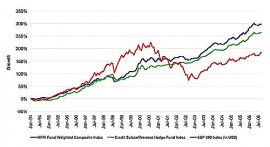
Who Is Making Use Of Hedge Funds?
The hedge investment's increase in popularity could be caused by a few elements. A few of the largest retirement resources worldwide have openly announced that a percentage of these possessions would-be put to use in hedge funds.
While the retirement benefits are not devoting a large percentage of their particular portfolios, given the absolute measurements of the retirement benefits by themselves (Ca Public Employees' pension program at this time manages well over $200 billion in possessions), this nonetheless sums to a huge pool of possessions for fund managers. Analysis firm Tremont Advisors estimates that total assets under management for hedge funds happens to be in the number of $1.2 trillion, of which about 25per cent is made up of institutional cash.
Next, many top financial strategists and money managers have already been leaving their particular posts at notable asset-management and wire residence businesses to start out hedge funds, all with high quantities of publicity and trader demand. Furthermore, the bear market of 2000-2002 scared many investors, both institutional and retail, into searching for financial investment possibilities which do not move lock-step with equity indexes. Hedge resources offer this possibility, as most are not benchmark-driven, alternatively seeking to create constant and positive comes back, 12 months in and year away.
Absolute Vs. General Returns
Many hedge resources and private equity funds are dedicated to absolute comes back unlike relative comes back. For instance, consider per year as soon as the S&P 500 is down 10percent or maybe more. If a large limit mutual fund were becoming down "only" 2-3percent because same year, most people would consider that a good 12 months, even though that they had lost cash. Many retail investors tend to be trained to believe in this "relative performance" way, but the majority hedge fund managers are merely trying to generate income every year. Due to the target absolute returns, hedge resources may trail equity indexes during bull market years. It is during bear areas, however, that hedge investment indexes demonstrate their many encouraging results.
Hedge resources supply a built-in energy at their disposal; like boxing with no gloves on, hedge funds are best recognized for their ability to utilize leverage, buy derivative securities and possess an incredibly large turnover, all in the search of alpha - the investing guaranteed land of positive returns that can't be explained by general stock exchange gains.
The chart here reveals the rise of two well-known hedge fund indexes (the blue becoming the HFRI Fund Weighted Composite Index plus the green series being the Credit Suisee/Tremont Hedge Fund Index) calculated contrary to the S&P 500 index between 1994 and 2006:
 |
| Resource: CSFB/Tremont |
In watching the chart above, spot the returns of this three indexes during period from 2000-2002, when major equity indexes were essentially cut-in half. Hedge fund comes back, however, were stable, publishing marginally positive returns. And talking about stock exchange returns, numerous retirement along with other institutional supervisors tend to be quite focused on the outlook of stock market returns not-living up to the 12per cent plus per year the S&P has-been earning since 1986. The long-term story on Wall Street is the fact that returns will revert to your historical average, that will be closer to 8per cent.
YOU MIGHT ALSO LIKE












